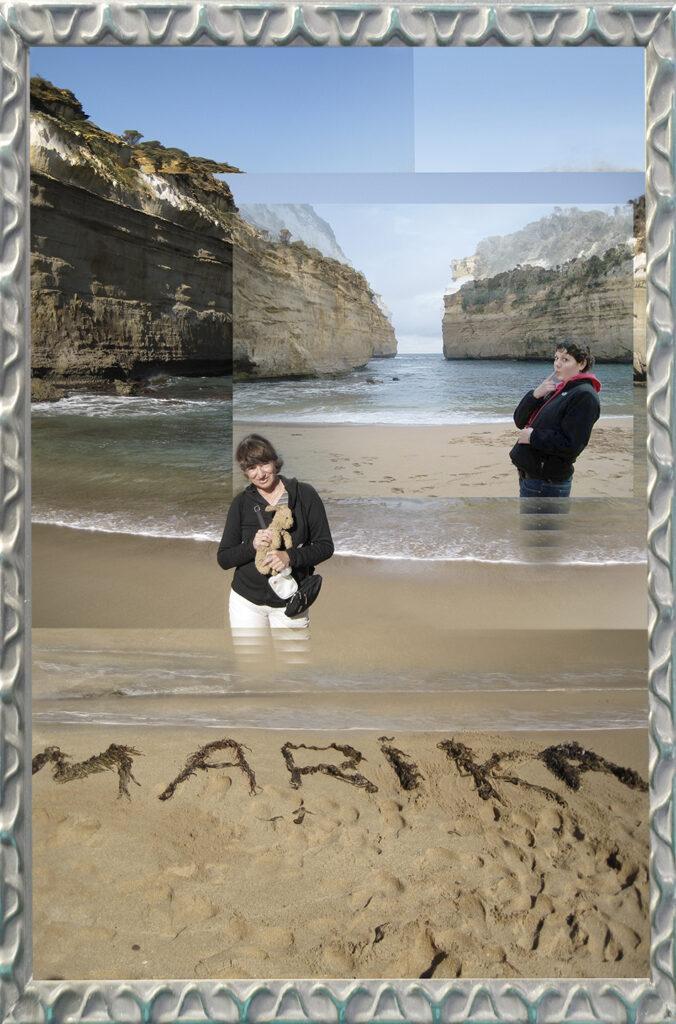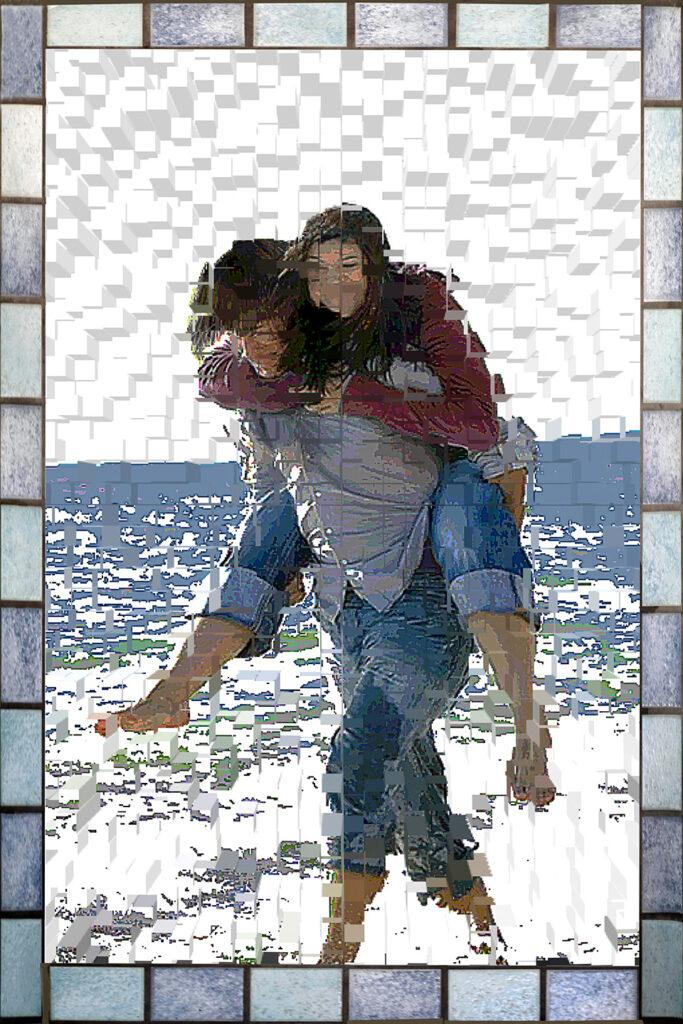In southeast Australia, in the tiny town of Port Campbell, in the room with the bay view, I wake to sunlight and sounds of birdsong. I wake from dreams of carrying too much in too many pieces, endlessly trying to hold on to what I have.
What I have is an explosion of memories. And Marika’s poems. And a couple of photographs to guide me to where, in Australia, Marika had been when she was here two years before. And it’s Friday, so there’s a V-Line bus that runs along the Great Ocean Road. If I time my day right and catch the bus coming and going, I can ride over twenty-two miles back and forth and, in-between, spend the day walking trails in and around the sites Marika had photographed. If I hop on and off the bus like Marika did I won’t wear out my feet and energy just in traveling to all the places I want to go.
The bus lets me off near the Loch Ard Gorge, and I climb down countless sets of wooden stairs to stand in the place Marika had stood, posing with a finger to her lips, a dubious expression on her face. Loch Ard means ‘high lake,’ but I am low down in the sand between two caves and a blue bay. ‘High’ are the two massive walls of stone that surround the small beach, leaving open only a narrow gap to the sea. “Eva’s cave,” I remember from the legend, and head toward the larger cave.
When I first saw “Eva Carmichael and Tom Pearce” written in Marika’s scrapbook, I thought they were the names of rock stars. I didn’t know Loch Ard was the name of a large clipper ship that sank in 1878, leaving these two the sole survivors. Inspired by tragedy and romance, Marika had written a poem about the two eighteen-year-olds. I, too, am captivated by the story of the apprentice sailor Tom swimming out in the dark, in strong winds and huge waves, to rescue Eva who clung to a floating part of the wrecked ship in only her nightdress. He carried her to a cave and at first light climbed the high cliffs of the gorge to find help. Tom was heralded as a hero, and the townspeople hoped for a romantic union of the two, but they went their separate ways. “She’ll stay forever alone, ‘cause it’s her way, she’s going back home,” Marika wrote twice in her short poem. From the local literature, I learned that Eva fainted, was weak or unconscious for hours, hid terrified in the cave awaiting Tom’s return, and had to be carried with difficulty up the cliffs. But Marika saw her as strong and in control. I saw Marika as strong and in control. I wonder how she saw me.
For a long while I stand watching, trying to see into the long dark cave. I do not enter. My courage has not yet replenished itself from the rogue wave at Bells Beach. Luckily the waves are small here. I finally roll up my pants and wade into the shallow water. No one is at the Loch Ard Gorge this early in the morning so I sing lullabies to Marika as I toss her ashes in small sprays. Then, gathering strands of seaweed that litter the beach near Eva’s cave, I arrange them to spell MARIKA in large letters. Soon people trickle down the stairs into our space. I wait to hear them say her name aloud when they see the seaweed letters. This past year friends hadn’t mentioned Marika, afraid they would upset me, and I’m desperate to hear her name and talk about her. But I don’t want to make people sad, ruin someone’s day with the intrusion of a pathetic mother who lost her daughter. I pack up to go. Except for my footprints in the sand and Marika’s name in seaweed, I leave no trace of us.
It’s a short walk east along the Great Ocean Road to Gibson’s Steps where 86 stairs are carved into the face of the cliffs high over crashing waves. Supposedly, if I climb all the way down, I can walk on the beach and see the giant rocks rising from sea level. But I see rising frothing water below, so I sit on a step halfway down, and picnic on a cold beef-and-Guinness pie from my pack. I consider how one journey leads to another, and how in every place there is a story waiting or some lesson to be learned. If I were traveling with another person I’d be braver. I’d cover more territory and do more things. But then, I wonder, anchored to another, how much of the story might I miss?
Backtracking west a short way along the rugged cliffs from Gibson’s Steps, I reach The Twelve Apostles, the major highlight for many travelers along the Great Ocean Road. Here, twenty million years of marine organisms’ skeletal fragments have built up into steep limestone towers. Endlessly attacked by blasting winds and the savage Southern Ocean, their cliffs crack and erode into caves and gorges. These eventually collapse into towering stacks of rocks. Not quite twelve of these rock giants stand in the teeming surf where time, wind, and water continue to gut their softer spots, giving them character. Isn’t it always the most common universal elements, like pain and loss, which shape human lives as well? I wonder. In pounding waves, I picture the rock stacks as giant matriarchs bellowing thunderous laughter. Life constantly crashes down around them while nesting seabirds find comfort in the nooks and crannies of their capstones.
I throw Marika’s beaded bracelets off the overhang as hard as I can to reach them. The giants gobble up the jewels, adding the bits of glass and plastic to their accumulations. Then I spend the rest of the afternoon with them, thinking of time, ongoing life, and the hearty women back home who saved me by listening. Now over thirty women, made stronger by life’s poundings, share my stories with their daughters, cousins, and friends. They’ve sent me encouraging words. I hug the last quarter of my daughter’s ashes in awe of the greatness that surrounds me. And worry, what will I hug once the jewels and the ashes are gone?

